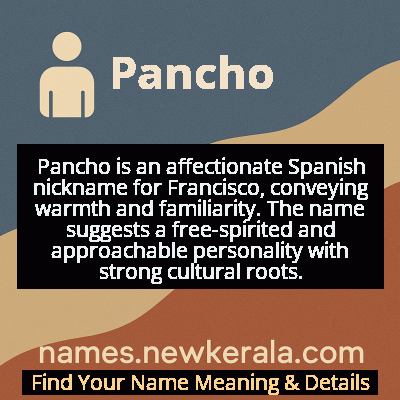Pancho Name Meaning & Details
Origin, Popularity, Numerology Analysis & Name Meaning of Pancho
Discover the origin, meaning, and cultural significance of the name PANCHO. Delve into its historical roots and explore the lasting impact it has had on communities and traditions.
Name
Pancho
Gender
Male
Origin
Spanish
Lucky Number
3
Meaning of the Name - Pancho
Pancho is an affectionate Spanish nickname for Francisco, conveying warmth and familiarity. The name suggests a free-spirited and approachable personality with strong cultural roots.
Pancho - Complete Numerology Analysis
Your Numerology Number
Based on Pythagorean Numerology System
Ruling Planet
Jupiter
Positive Nature
Optimistic, inspirational, and creative.
Negative Traits
Scattered, exaggerating.
Lucky Colours
Yellow, gold, purple.
Lucky Days
Thursday.
Lucky Stones
Yellow sapphire.
Harmony Numbers
1, 2, 9.
Best Suited Professions
Arts, writing, communication.
What People Like About You
Creativity, optimism.
Famous People Named Pancho
Pancho Villa
Revolutionary leader
Led the Northern Division during Mexican Revolution and became a folk hero
Pancho Segura
Tennis player
Multiple US Pro Championships winner and tennis innovator
Pancho Gonzales
Tennis player
World No. 1 tennis player for eight consecutive years
Pancho Barnes
Aviator
Broke air speed records and pioneered women's aviation
Name Variations & International Equivalents
Click on blue names to explore their detailed meanings. Gray names with will be available soon.
Cultural & Historical Significance
Throughout Latin America, Pancho is used as an affectionate nickname that bridges formal and informal relationships, creating immediate familiarity and trust between individuals. The name has become embedded in cultural expressions, from folk songs to literature, representing both revolutionary ideals and everyday heroism in Hispanic communities worldwide. Its usage reflects the cultural importance of nicknames in Spanish-speaking societies, where diminutives serve to express affection and establish social bonds while maintaining cultural identity across generations.
Extended Personality Analysis
Individuals named Pancho are typically perceived as warm, approachable, and charismatic, with a natural ability to connect with people from all walks of life. They often possess a strong sense of independence and self-reliance, combined with a deep loyalty to family and community. Panchos are frequently described as having a 'larger than life' personality - confident, bold, and unafraid to take risks or stand up for their beliefs. They tend to be resourceful problem-solvers who approach challenges with creativity and determination.
At the same time, Panchos often maintain a sense of humor and playfulness that makes them popular in social settings. Their personality blends traditional values with progressive thinking, creating individuals who respect heritage while embracing innovation. Many Panchos exhibit natural leadership qualities, though they typically lead through inspiration rather than authority, preferring to empower others rather than command them. This combination of strength and approachability makes Panchos particularly effective in roles that require both conviction and compassion, allowing them to build strong, lasting relationships while pursuing meaningful goals.
Modern Usage & Popularity
In contemporary times, Pancho remains a popular nickname throughout the Spanish-speaking world, though its usage as a given name has become more selective. While still common in Mexico, Central America, and South American countries, the name has seen a decline in formal registration in favor of the full name Francisco, with Pancho reserved for familiar contexts. In the United States, Pancho is recognized primarily through cultural references and is occasionally used by Hispanic families maintaining traditional naming customs. The name carries a nostalgic quality for older generations while younger parents may view it as somewhat dated. However, recent trends show a mild resurgence as parents seek distinctive yet culturally grounded names that honor heritage while standing out from more common choices. Pancho maintains strong appeal in artistic and creative circles, where its association with rebellion and authenticity resonates with contemporary values of individuality and cultural pride.
Symbolic & Spiritual Meanings
Symbolically, Pancho represents freedom, rebellion, and authenticity. The name evokes the spirit of independence and resistance against conformity, drawing from its association with revolutionary figures and folk heroes. It symbolizes the courage to challenge established systems and fight for justice, while maintaining connection to one's cultural roots and community values. Pancho also represents warmth and approachability - the ability to bridge social divides and create genuine human connections. The name carries connotations of resilience and adaptability, suggesting someone who can thrive in challenging circumstances through ingenuity and determination. In a broader sense, Pancho symbolizes the balance between tradition and progress, honoring heritage while embracing change, and embodies the idea of the 'everyman hero' - ordinary people capable of extraordinary actions when guided by strong principles and compassion for others.

